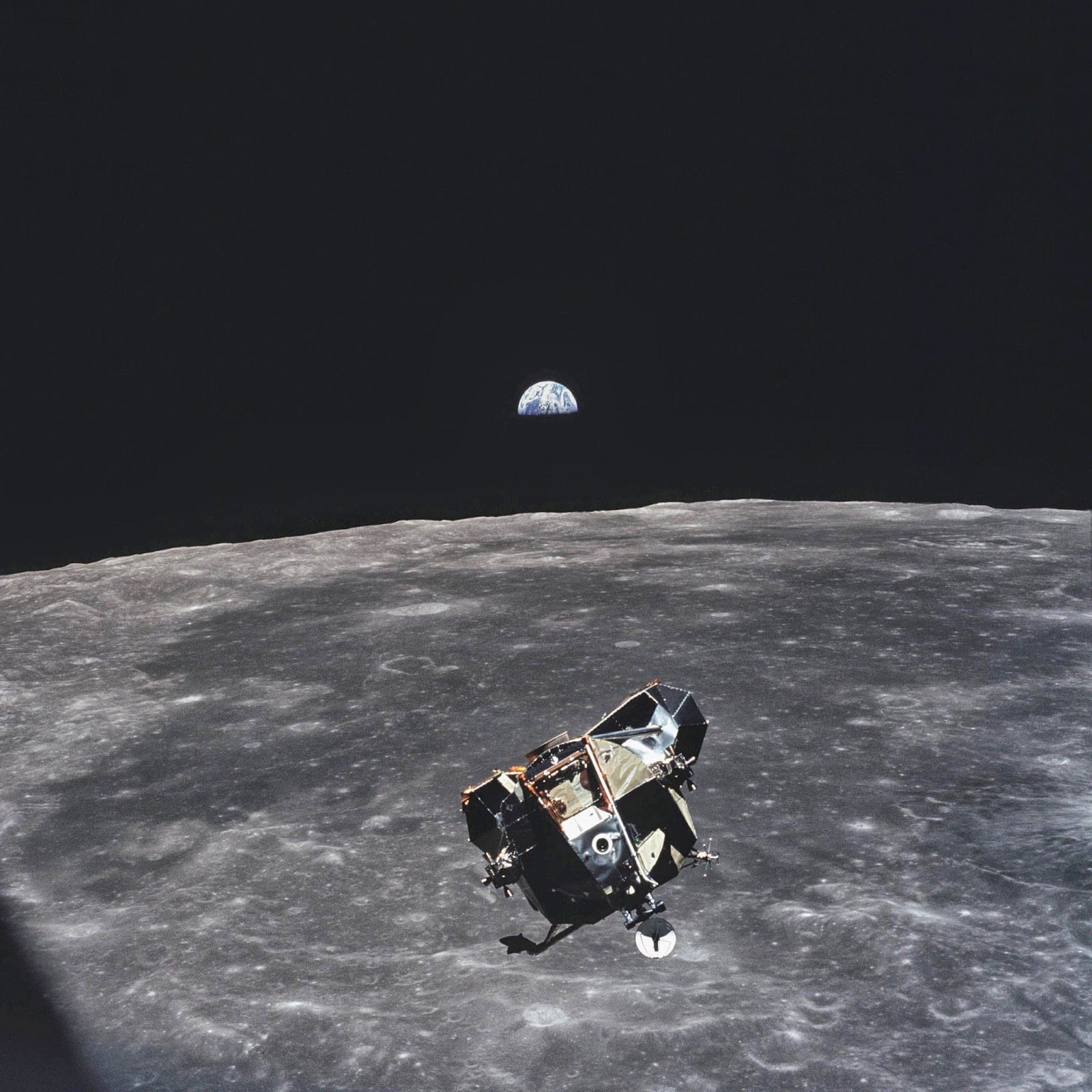Isolation, not individualism

I recently learned a fact that I cant stop thinking about. During the 1969 moon landing, the third pilot of Apollo 11, Michael Collins, remained on the spaceship while the lunar lander took that huge leap for mankind. While Buzz and Neil made history, history’s forgotten boy Collins was alone in orbit, and was the furthest away physically any one had ever been from any other human being. In the photo he took, above, the moon lander hovers above the moon and below the tiny silhouette of the earth. Collins is the only living human being not captured in this photograph. In a literal sense, he is the most alone anyone has ever been.
The moon landing is celebrated as an awe inspiring achievement of progress, of power. The hypocrisy of the moment is succinctly summarized by Gil Scot-Heron in Whitey on the Moon:
The man just upped my rent last night
Cuz whitey’s on the moon.
No hot water, no toilets, no lights
But whitey’s on the moon.
The moon landing was so much less significant scientifically than it was socially, as a mass pseudo-demystification of the great lunar symbol of all we can’t quite know. It is only a pseudo-demystification because while it seemingly collapsed the distance of that object, the project actually taught humanity much more about rockets—and ultimately intercontinental missiles of global annihilation—then it taught us anything about the moon, most of which we can learn through telescopes, through earth-bound observation. And because the jerks left that horrid vulgar mark, an American flag, and other assorted trash on that magickal place.
But it was learning about Collins’ isolation that made me realize what the real achievement of the moon landing was: it was a moment of total, complete isolation, masquerading via TV broadcast to be a moment of total togetherness. “One giant leap for mankind”. Everyone sat alone in their homes, watching. As Guy Debord says, under the Spectacle “the true is a moment of the false.” (Yes, I’ve done my semi-regular reread of Society of the Spectacle recently, lol)
The true achievement of capitalist science, exploration and power is to produce ever more intensified and spectacular isolation, portraying itself to us as its opposite, as deeper and deeper interconnectedness. In social media and internet claims that “we have never been more connected” at the exact moment that we have never been more lonely; in claims that the world is smaller and smaller as there are more people on earth than ever before; in claims that we are the wealthiest and most prosperous we have ever been as inequality achieves unimaginable proportions and our great wealth in life, creativity and knowledge is destroyed oil well by oil well; in claims that we’ve never had more knowledge and information as fascist scientific denialism and conspiracy rips apart our social fabrics. As Debord argues, the great metaphysical achievement of the spectacle is to confuse quantity for quality.
Lately I’ve been engaging with a lot of writing and thinking about cult dynamics and Christo-fascist politics, and one phrase that I’ve heard a lot in these discourses is about American “individualism.” But I think individualism as a term of critique is incorrect. We are all individuated, made individual subjects, through a mass process of identical forms of isolation: we are all exactly as individual from one another as the market commands.
Colloquially, the phrase is used to point to the greed, narcissism and “I’ve got mine” attitude that pervades US culture, but the fact is that this attitude is held identically among all of its proponents: calling this ‘individualism’ allows their conformity to be portrayed as a reflection of a fundamental truth about human individuals, about their needs, survival, and selfishness. “Look at how all these individuals arrive at the same conclusion” is the pseudo-social-scientific ideological basis of reactionary mass delusion. “Do your own research”
The only communalism (its putative opposite) we are provided access to is the communal experience of our identically-produced isolations. It is understandable that in moments of struggle, solidarity, cultural organizing and movement we focus on the actual community, actual togetherness it produces. But as anyone who has been in this genuine communalism will recognize, it also affords us the greatest and most powerful opportunities for self-recognition, for understanding ourselves as individuals, that we will experience.
Both sides of the dichotomy are intertwined and perverted, and when we say the problem is of “individualism” we give far too much credit to this greed and selfishness, itself a systemically produced response to a fundamental disempowerment and alienation. We give away too much that is powerful and beautiful in the processes of self-realization, desiring, pleasure and experience, of the kind of feelings that might emerge as part of a true individualism. Instead, I think we should speak of isolation, alienation, and sorrow. The problem is not thinking too much about ourselves, the problem is the creation of a single subject so intensely isolated from her fellows that she can not recognize how interconnected her experiences are, that she is ultimately isolated from self-knowledge, leaving her deeply vulnerable to consumption, addiction, cults, fascism, and the rest.
Michael Collins is the true product of the space race, of capitalist modernity, of exploration and techno-capital power: an individual so intensely far away from all other human beings that it can grasped visually, that it can be measured in hundreds of thousands of miles. It is no mistake he is the astronaut we forget. This forgotten scientist, alone with his photographic equipment, maintaining the actual material objects (the space ship, its food, atmosphere and capacity to return home) that can reproduce the two men bravely stumbling across the rocky darkness below, represents the real knowledge production of American patriarchal scientism. A science of true togetherness would also be a science of the first real individualism any of us have known.
